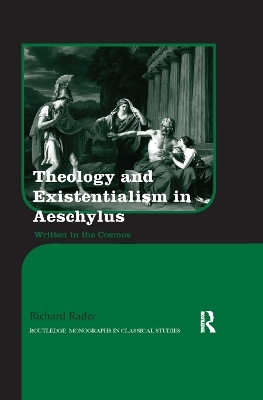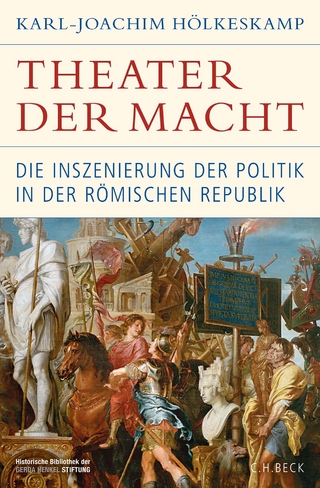
Theology and Existentialism in Aeschylus
Written in the Cosmos
Seiten
2019
Routledge (Verlag)
978-0-367-87068-3 (ISBN)
Routledge (Verlag)
978-0-367-87068-3 (ISBN)
Theology and Existentialism in Aeschylus revivifies the complex question of fate and freedom in the tragedies of the famous Greek playwright. In this book, author Ric Rader demonstrates that few understood the importance of these questions better than the tragedians, whose literature dealt with a central theological concern:
Theology and Existentialism in Aeschylus revivifies the complex question of fate and freedom in the tragedies of the famous Greek playwright. Starting with Sartre’s insights about radical existential freedom, this book shows that Aeschylus is concerned with the ethical ramifications of surrendering our lives to fatalism (gods, curses, inherited guilt) and thoroughly interrogates the plays for their complex insights into theology and human motivation. But can we reconcile the radical freedom of existentialism and the seemingly fatal world of tragedy, where gods and curses and necessities wreak havoc on individual autonomy? If forces beyond our control or comprehension are influencing our lives, what happens to choice? How are we to conceive of ethics in a world studiously indifferent to our choices?
In this book, author Ric Rader demonstrates that few understood the importance of these questions better than the tragedians, whose literature dealt with a central theological concern: What is a god? And how does god affect, impinge upon, or even enable human freedom? Perhaps more importantly: If god is dead, is everything possible, or nothing? Tragedy holds the preeminent position with regard to these questions, and Aeschylus, our earliest surviving tragedian, is the best witness to these complex theological issues.
Theology and Existentialism in Aeschylus revivifies the complex question of fate and freedom in the tragedies of the famous Greek playwright. Starting with Sartre’s insights about radical existential freedom, this book shows that Aeschylus is concerned with the ethical ramifications of surrendering our lives to fatalism (gods, curses, inherited guilt) and thoroughly interrogates the plays for their complex insights into theology and human motivation. But can we reconcile the radical freedom of existentialism and the seemingly fatal world of tragedy, where gods and curses and necessities wreak havoc on individual autonomy? If forces beyond our control or comprehension are influencing our lives, what happens to choice? How are we to conceive of ethics in a world studiously indifferent to our choices?
In this book, author Ric Rader demonstrates that few understood the importance of these questions better than the tragedians, whose literature dealt with a central theological concern: What is a god? And how does god affect, impinge upon, or even enable human freedom? Perhaps more importantly: If god is dead, is everything possible, or nothing? Tragedy holds the preeminent position with regard to these questions, and Aeschylus, our earliest surviving tragedian, is the best witness to these complex theological issues.
Richard Rader teaches Latin and Greek at Montgomery Bell Academy, USA. He was Visiting Assistant Professor in the Department of Classics at the University of California at Santa Barbara, USA. Prior to UCSB he held a Mellon Postdoctoral Teaching Fellowship at USC. He is co-editor of The Enigmatic Context: Approaches to Greek Drama (2013).
Introduction: Written in the Cosmos 1. The Radical Theology of Prometheus Bound or On Prometheus’ God Problem 2. The Curse of Inherited Guilt in Seven against Thebes 3. The Necessity of Agamemnon 4. Fatal Aftermaths: Libation-Bearers and Eumenides
| Erscheinungsdatum | 24.12.2019 |
|---|---|
| Reihe/Serie | Routledge Monographs in Classical Studies |
| Verlagsort | London |
| Sprache | englisch |
| Maße | 152 x 229 mm |
| Gewicht | 453 g |
| Themenwelt | Literatur ► Klassiker / Moderne Klassiker |
| Geschichte ► Allgemeine Geschichte ► Altertum / Antike | |
| Geisteswissenschaften ► Philosophie ► Geschichte der Philosophie | |
| Geisteswissenschaften ► Philosophie ► Philosophie Altertum / Antike | |
| Geisteswissenschaften ► Philosophie ► Philosophie der Neuzeit | |
| Geisteswissenschaften ► Religion / Theologie | |
| Geisteswissenschaften ► Sprach- / Literaturwissenschaft ► Anglistik / Amerikanistik | |
| Geisteswissenschaften ► Sprach- / Literaturwissenschaft ► Literaturwissenschaft | |
| ISBN-10 | 0-367-87068-1 / 0367870681 |
| ISBN-13 | 978-0-367-87068-3 / 9780367870683 |
| Zustand | Neuware |
| Haben Sie eine Frage zum Produkt? |
Mehr entdecken
aus dem Bereich
aus dem Bereich
Die unglaubliche Geschichte eines antiken Söldnerheeres
Buch | Hardcover (2022)
C.H.Beck (Verlag)
CHF 39,20
die Inszenierung der Politik in der römischen Republik
Buch | Hardcover (2023)
C.H.Beck (Verlag)
CHF 67,20


